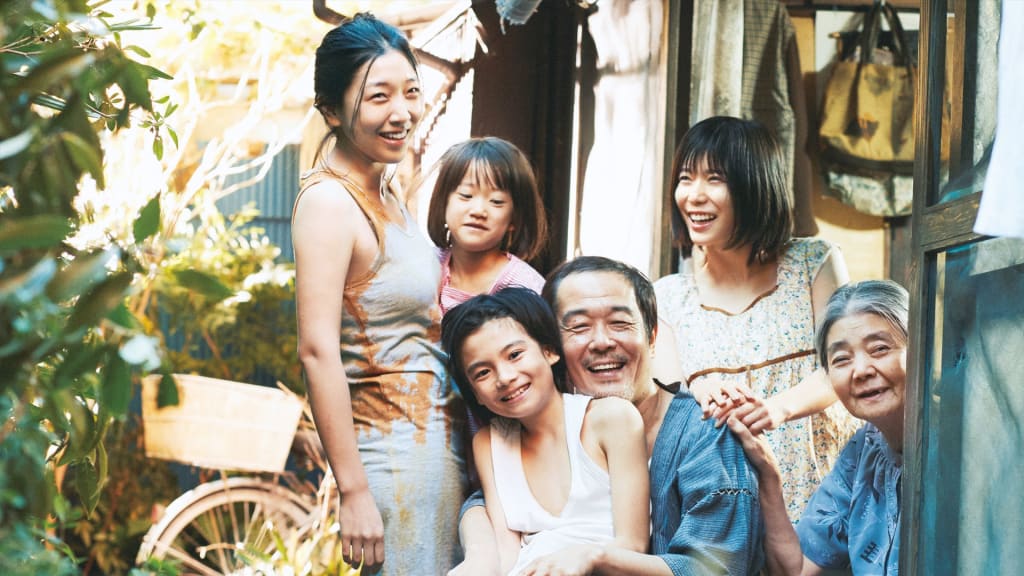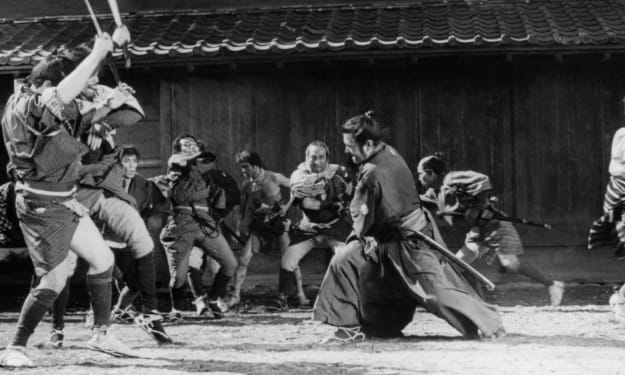SHOPLIFTERS Exposes Unseen Japan
How Hirokazu Kore-eda's groundbreaking film shines a much-needed light on the neglected people of Japan

This is a transcription of an episode of my podcast, Japan On Film
It's been said that one of Japan's most-valuable exports is its culture. The Japanese passport has been ranked as the most powerful in the world because Japanese citizens can enter 191 countries without a visa. And in large part that is no doubt because of the soft power Japan wields in the world. Whenever I tell people I live in Japan, I always get one of the following responses:
It must be like living in the future!
I bet everyone watches anime.
Everyone's so polite and kind.
Tokyo's probably amazing!
It must be so expensive to live there!
... and so on. Thanks in large part to Japan's cultural exports (music, movies, anime, manga, games, etc), many people have a positive image of Japan and tend to only see the best aspects of Japanese society.
Prime Minister Shinzo Abe is quick to praise almost any success someone of Japanese descent achieves on the international stage and to praise Japanese culture that gains recognition abroad. Kazuo Ishiguro, for example, is not a Japanese citizen, has lived most of his life in England, and barely speaks Japanese, yet that didn’t stop Abe from personally congratulating him when he won the Nobel Prize last year.
Shoplifters has won many awards, including the Palme d’Or at Cannes, a whole slate of Japan Academy Prizes (including Picture of the Year, Director of the Year, Screenplay of the Year, and Outstanding Actress), and was been nominated for the Oscar for Best Foreign Language Film. So you’d think with all this international attention and praise, Abe would say something about Kore-eda. But he’s remained completely silent.
Why?
Abe's ruling party is the Liberal Democratic Party (LDP). It's a far-right nationalist party which has held near-unchallenged control of the government for decades. Shoplifters generated quite a lot of controversy in Japan because of how it highlights poverty, something that the LDP would prefer remain swept under the rug.
Abe's allies have criticized the film, condemning it for promoting and condoning crime, and accusing it of being political propaganda. It’s not unusual for right-wingers in Japan to lash out at movies for condoning illicit behavior when really they’re angered about the politically charged subject matter (the excellent Battle Royale garnered a similar response). Also, Kore-eda has been critical of Abe and the LDP for their attempts to revise the pacifist constitution and he’s also said that Japan has failed to atone for its wartime atrocities.
All that being said, Shoplifters isn’t an explicitly political movie, not unless you believe that accurate portrayals of harsh truths constitute political propaganda.
And the fact of the matter is that this movie does reflect some harsh truths about modern Japan. Due to the decades-long recession that hit Japan following the collapse of the asset price bubble, poverty has grown. One in six Japanese children lives in poverty, as does half of all single-mother households. Wages have been stagnant for years and full-time regular employment is in decline. Many lower income workers in Japan get by because they string together several different part-time jobs. And political reforms have been insignificant. Most of Abe’s attempts at reform have only really helped the rich, who have benefited from increased tax cuts. Meanwhile, the rest of Japanese society continues to be left behind through increases in consumption taxes, austerity policies, and a weakened yen which has made imports (something Japan is very dependent on) more expensive.
Shoplifters centers on a family living on the outskirts of Tokyo in a small, old house. Osamu is a day laborer who’s forced to leave his job after he injured his ankle. His wife, Nobuyo, works for an industrial laundry service. The younger woman, Aki, works at a kind of strip club. There’s also Hatsue, an elderly woman who supports the family through her dead husband’s pension. And Shota, a young boy who supports the family by working with Osamu to shoplift whatever they may need, such as food and toiletries, as well as occasionally stealing more expensive items to pawn off later. Osamu’s logic is that if they steal from a shop, they’re not really stealing from anyone as no one has bought the item yet.
One night after a round of shoplifting, Osamu and Shota find a young girl named Yuri locked out of her apartment’s balcony, despite the cold weather. They decide to take her home with them so they can give her a warm meal and a place to stay for the night, intending to return her home in the morning. But they quickly decide to keep her once they discover signs that she’s been abused. A few days later, when a news report announces that Yuri is missing, the family cuts her hair and changes her name to Rin so they won’t be found out.
We quickly learn in the movie that this family isn’t actually related. Osamu and Nobuyo have been together ever since they killed Nobuyo’s abusive former lover in a crime of passion. After Hatsue’s husband left her, he had a son with a new wife and that son’s daughter is Aki. Even though she lives with Hatsue and the family now, Aki’s parents believe she’s living abroad in Australia. And Shota was found by Osamu and Nobuyo inside a locked car.
The movie is an unflinching portrayal of poverty in modern-day Japan. Kore-eda researched families who were struggling in poverty, consulted with non-profit organizations, and also went to a care home for abused children to speak to the kids there. In an article about this movie for The Daily Beast by Jake Adelstein, Kore-eda is quoted as saying the following:
While we were there, kids started to come back from school and I asked one little girl what she was studying at school. She pulled out her Japanese class textbook from her backpack and suddenly started reading Leo Lionni’s Swimmy out loud to us. The facility staff scolded her, ‘Everyone’s busy, you shouldn’t bother them,’ but she refused to listen and read to us the story from beginning to end. When she finished and we all clapped for her, she beamed at us with such joy. It was in that moment I thought, maybe what she really wants is to read that out loud to her parents who she doesn't get to live with. After that, the face of this little girl reading to us haunted me and I wrote the scene in which the boy reads his textbook out loud right away.
Source: Prize-Winning 'Shoplifters': Japan's PM Hates This Movie Because It's Just Too True
Swimmy is the story of a tiny black fish who lives with a school of red fish. A big tuna eats his family and he escapes only because he can swim fast. He soon finds another school of fish and trains them to swim together so they look like one big fish, thus scaring off any potential predators.
The metaphor is probably pretty clear in the movie. This is a family brought together not by blood, but by circumstance, and they stick together for survival. When they consider bringing Rin back to her parents, they take her to the apartment, but they can hear arguing from inside. They hear her father (or perhaps step-father) say that Rin was never his child to begin with and her mother scream that she didn’t want the girl, either. In fact, it wasn’t even the parents who reported Rin as missing—they never bothered to report it because they didn’t really want her back.
In one particularly touching scene, Nobuyo is sitting with Rin on the back porch of their house. She tells her that “When people say they’re hitting you because they love you, that’s a lie. This is what you do when you love someone” and she hugs Rin tightly. It’s a moment made all the more poignant when we learn that Nobuyo was also abused by her ex.
One of the things I loved about it is the notion that family needn’t be blood. The only characters who can come close to claiming a family link in the traditional sense are Hatsue and Aki, but even that is tenuous. After all, I’m the product of my father’s second marriage and I don’t have any link with his ex-wife’s mother.
But none of that matters, because this family behaves in the way that a real family should. Their house may be a mess and falling apart, they may do questionable things to survive, but their love for each other is pretty much never in question. They support each other, they talk with each other, they eat together, they spend time together, they laugh together. In a society where it’s increasingly common for the father to work overtime and come home late, the mother doing the housework and managing the finances, and the kids tied up in either after-school clubs or cram schools to prepare for grueling exams, families don’t spend a whole lot of time together.
So this manbiki-kazoku (shoplifting family) actually has a stronger bond than most actual families, a fact stated in a particularly beautiful interaction between Nobuyo and Hatsue. Hatsue says she was sure that Rin would choose to go home. Nobuyo asks if Hatsue thinks Rin chose to be with them. Hatsue says that usually you can’t choose your own parents and Nobuyo tells her that maybe the bond is stronger when you choose them yourself. Hatsue pauses and tells Nobuyo that, “I chose you, too.”
Unfortunately, the family’s happiness can’t last. When they spend a day at the beach, Hatsue is content knowing that she won’t die alone and she actually does die that very night. And a difficult choice is made. The family knows that if they report Hatsue’s death, they’ll lose the pension money they’ve been depending on for survival. So instead, they decide to bury her under the house.
That sets off a chain of bad luck. Shota feels guilt at teaching Rin how to steal and then when Osamu breaks into a car to steal a purse, Shota believes that it violates the code Osamu taught him about stealing from shops. To prevent Rin from stealing, Shota intervenes in a shoplifting attempt in full view. While running from the staff, he breaks his leg and is taken to the hospital.
The rest of the family is caught soon after and the police then discover Hatsue’s body under the house. Nobuyo takes the heat for the crimes and goes to prison so Osamu can remain free, Rin is returned to her parents, and Shota is taken to an orphanage.
There’s no real plot in the traditional sense. Instead, the movie is much more like a collection of events that transpire with this family, and in the process we get an insight into these different worlds. One example is when Hatsue tells a man that she won’t give up her house, a reference to real estate companies buying up land so they can build modern, high-priced apartment buildings. You can see this in the neighborhood their house is in—surrounded by apartment buildings.
Another is the treatment of workers. Before Osamu is injured, we see a scene where he and his co-workers talk about some other workers who just stopped coming in and quit via email. Osamu receives no compensation for his injury. And at Nobuyo’s job, her boss is forced to make cutbacks. But rather than decide between Nobuyo and her co-worker who will be fired, he tells them to discuss it amongst themselves, so there’s this sense of pitting workers against each other, and that kind of division only prevents them from standing strong against unfair practices by employers.
In Aki’s situation, we get a look at what’s known in Japan as mizu-shobai. The literal translation of that is ”water trade” and it’s a euphemism for nighttime and adult entertainment. Aki works at a peep club where she dresses in a school uniform and masturbates herself behind a glass divider for a paying customer, and she earns up to ¥3,000 per hour for that.
And finally, there’s Nobuyo and Rin’s shared experiences of abuse, which has to do with the abuse of women and children. Unfortunately, it’s not uncommon and little is done to combat or prevent it by officials. According to Japan’s National Police Agency, the number of suspected child abuse cases in 2018 rose by 22%.
What Rin goes through at the hands of her parents and how the authorities arrest the family and return her to the very environment where she suffered abuse highlights this. The movie doesn’t offer a very positive outlook for her, either. When we see her back at her parents’ home, her mother is trying to apply makeup to cover up bruises no doubt received from her father. Rin goes to her mom, who turns her away and tells her not to touch her. The very last scene of the movie is heartbreaking—Rin stands on a crate, looking over her balcony, obviously waiting for her new family to rescue her like they once did before.
The performances in the film are incredible. Lily Franky and Sakura Ando play Osamu and Nobuyo and you really believe their love for each other and the rest of the family. Ando in particular has a great moment when the social worker tells her Rin has been given back to her parents. When Nobuyo says she doesn’t believe Rin asked to go home, the social worker tells her that children needs their mothers. Nobuyo says that’s just something mothers say and asks if giving birth automatically makes you a mother. The social worker asks her if the kids called her “Mommy,” and Kore-eda keeps the camera locked on Ando’s face. She gives an incredibly emotional performance with her expressions and only responds with, “I wonder.”
Young Miyu Sasaki plays Rin and though she doesn’t have many lines, she does an amazing job of conveying her emotions mostly through expressions. The contrast of her expressions when she’s with Nobuyo and then when she’s back with her birth mother is so incredibly stark.
Hatsue is played by Kirin Kiki, who I talked about in the episode on Kamikaze Girls. This was one of her final films before her death and she proves that even at the end of her career, she never stopped bringing her A-game.
I can’t really recommend Shoplifters enough. All the praise you’ve heard of the film is 100% justified and then some. It challenges traditional notions of family in its portrayal of one of the most unconventional families I’ve ever seen in a Japanese movie. It’s something of a tragic film because society eventually tears this family apart. The last time we see Hatsue’s home, Aki goes back there. She opens the door and the tatami room where the family usually gathered is no longer bright, but darkened and feels completely empty.
Sadly, that image sticks with me as a haunting metaphor of what continues to happen in Japan as the underclass is dismissed and ignored.
About the Creator
Percival Constantine
An action fiction novelist and a lifelong fan of comics and film. Discover my fiction at percivalconstantine.com.
Enjoyed the story? Support the Creator.
Subscribe for free to receive all their stories in your feed. You could also pledge your support or give them a one-off tip, letting them know you appreciate their work.






Comments
There are no comments for this story
Be the first to respond and start the conversation.